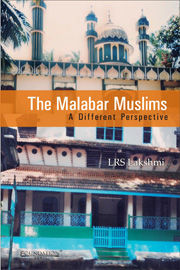Book contents
- Frontmatter
- Contents
- List of Maps
- List of Tables
- Acknowledgements
- List of Abbreviations
- Note on Transliteration
- Maps
- Introduction
- 1 The Hadhrami Roots
- 2 Family and Inheritance Laws: Continuities and Changes
- 3 Religious Spaces and Disputes
- 4 Reformist Trends
- 5 Education and Social Mobility
- 6 Mappilla Leadership and Political Mobilization
- 7 Mappillas in the Twenty-first Century: A Standing Applause
- Conclusion
- Appendix
- Glossary
- Bibliography
- Index
7 - Mappillas in the Twenty-first Century: A Standing Applause
Published online by Cambridge University Press: 05 June 2012
- Frontmatter
- Contents
- List of Maps
- List of Tables
- Acknowledgements
- List of Abbreviations
- Note on Transliteration
- Maps
- Introduction
- 1 The Hadhrami Roots
- 2 Family and Inheritance Laws: Continuities and Changes
- 3 Religious Spaces and Disputes
- 4 Reformist Trends
- 5 Education and Social Mobility
- 6 Mappilla Leadership and Political Mobilization
- 7 Mappillas in the Twenty-first Century: A Standing Applause
- Conclusion
- Appendix
- Glossary
- Bibliography
- Index
Summary
In the twenty-first century, Kerala now has a very prominent and progressive Muslim community which has moved forward in leaps and bounds. It has shown tremendous progress in the spheres of education, women empowerment, religion, politics, literature and other spheres of development.
Educational Progress
For the educational benefits of the Mappilla society, the Muslim Educational Society (MES) was founded in 1967 by an eminent neurologist from Kodungallur, Dr. Abdul Ghafoor. He studied Medicine in England and was a dedicated teacher at Kozhikode Medical College. In 1974, he renounced his profession for the cause of the social upliftment of the Mappilla community. His son, Dr. P.A. Fazal Ghafoor, also a neurologist, is the present State President of MES.
MES schools were opened all over Malabar, Cochin and Travancore. Colleges have also been founded. The present strength of MES institutions amount to more than one hundred and fifty. The funds for the institutions are derived from the donations made by the different members of the MES Trust and Board of Management. Yusuf Ali, an international industrialist, is a major trustee of the MES group of institutions. The medium of instruction in all the MES institutions is English and their schools are affiliated to the Central Board of Secondary Education.
Arabic is offered as an optional language and Islamic Studies is offered as one of the compulsory subjects for Muslim students. The Hindu students are given the choice of moral science in lieu of Islamic Studies.
- Type
- Chapter
- Information
- The Malabar MuslimsA Different Perspective, pp. 156 - 170Publisher: Foundation BooksPrint publication year: 2012

